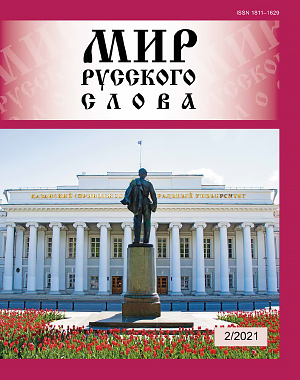«Думать и говорить, как ученые»: диагностика уровня сформированности научных понятий посредством лингвистического эксперимента (на примере общей и неорганической химии)
DOI:
https://doi.org/10.24412/1811-1629-2021-2-13-24Аннотация
В статье обсуждаются результаты лингвистического эксперимента, нацеленного на изучение понимания языковых выражений из учебников по общей и неорганической химии для вузов, тремя группами носителей русского языка: школьниками 8–11 класса, студентами направления «Химия», магистрантами и аспирантами направления «Филология». Эксперимент проводился по методике «третий лишний» с использованием гуглформ. Целью эксперимента было выяснить, на какой стадии освоения специальной дисциплины учащиеся начинают «думать и говорить, как ученые» (Дж. Лемке) и какую роль в оперировании элементами специального языка (как терминологическими, так и общими с общелитературным языком) может играть лингвистическая компетенция. Результаты эксперимента показывают, что лингвистическое преобразование (кросскультурный переход), необходимый для построения профессиональных естественнонаучных моделей, совершается в процессе получения высшего профессионального образования (студенты-химики). Подтвердилась также гипотеза о том, что высокая лингвистическая компетенция позволяет в некоторых случаях компенсировать невладение профессиональным знанием за счет более квалифицированного оперирования с языковыми единицами и контекстами (филологи). Худшие результаты, продемонстрированные группой школьников, объясняются недостаточностью как предметной, так и лингвистической компетенции этих респондентов. На основе анализа результатов эксперимента формулируются соответствующие задачи для преподавателей курса «Русский язык и культура речи» на естественнонаучных факультетах и предлагаются пути их решения, а также определяются проблемы, с которыми могут встречаться, с одной стороны, филологи и с другой — преподаватели языка специальности в ходе обучения студентов «думать и говорить, как ученые», и способы преодоления этих проблем.
Ключевые слова:
язык специальности, лингвистический эксперимент, химия, кросскультурный переход, научные концепты
Скачивания
Библиографические ссылки
References
Павлов 2016 — Pavlov I. P. Philology and psychology in the study of higher nervous activity of animals. In: Pavlov I. P. Fiziologiia. Izbrannye trudy. Moscow: Iurait Publ., 2016. P. 194–206. (in Russian)
Загрузки
Опубликован
Как цитировать
Выпуск
Раздел
Лицензия
Статьи журнала «Мир русского слова» находятся в открытом доступе и распространяются в соответствии с условиями Лицензионного Договора с Санкт-Петербургским государственным университетом, который бесплатно предоставляет авторам неограниченное распространение и самостоятельное архивирование.




